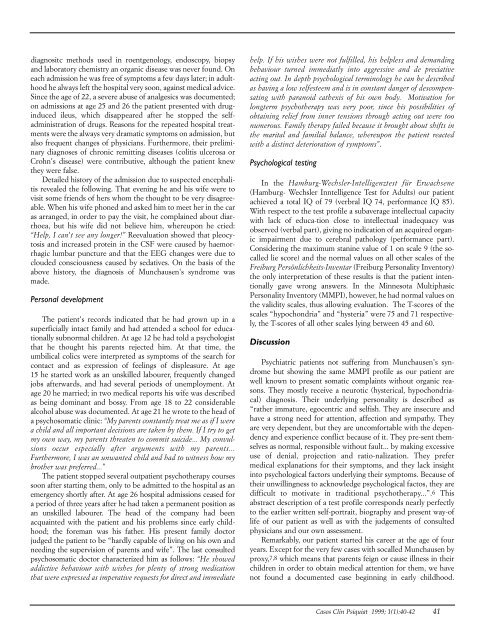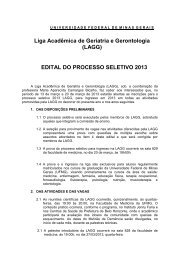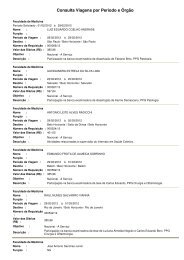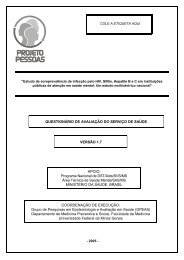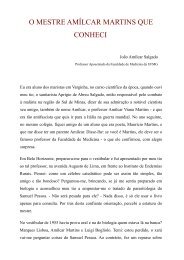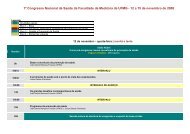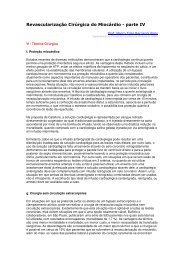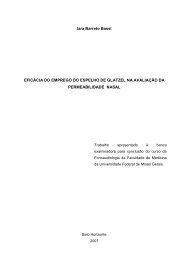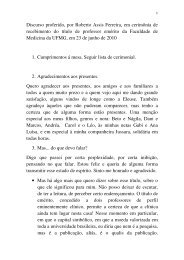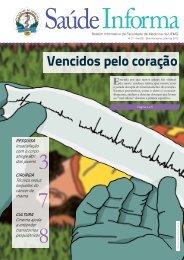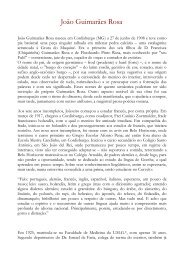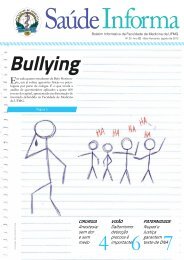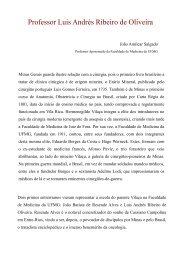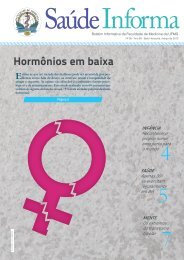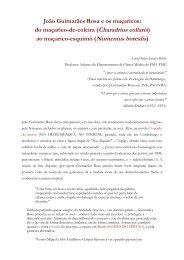Psiquiatria - Faculdade de Medicina - UFMG
Psiquiatria - Faculdade de Medicina - UFMG
Psiquiatria - Faculdade de Medicina - UFMG
You also want an ePaper? Increase the reach of your titles
YUMPU automatically turns print PDFs into web optimized ePapers that Google loves.
diagnositc methods used in roentgenology, endoscopy, biopsy<br />
and laboratory chemistry an organic disease was never found. On<br />
each admission he was free of symptoms a few days later; in adulthood<br />
he always left the hospital very soon, against medical advice.<br />
Since the age of 22, a severe abuse of analgesics was documented;<br />
on admissions at age 25 and 26 the patient presented with druginduced<br />
ileus, which disappeared after he stopped the selfadministration<br />
of drugs. Reasons for the repeated hospital treatments<br />
were the always very dramatic symptoms on admission, but<br />
also frequent changes of physicians. Furthermore, their preliminary<br />
diagnoses of chronic remitting diseases (colitis ulcerosa or<br />
Crohn's disease) were contributive, although the patient knew<br />
they were false.<br />
Detailed history of the admission due to suspected encephalitis<br />
revealed the following. That evening he and his wife were to<br />
visit some friends of hers whom the thought to be very disagreeable.<br />
When his wife phoned and asked him to meet her in the car<br />
as arranged, in or<strong>de</strong>r to pay the visit, he complained about diarrhoea,<br />
but his wife did not believe him, whereupon he cried:<br />
“Help, I can't see any longer!” Reevaluation showed that pleocytosis<br />
and increased protein in the CSF were caused by haemorrhagic<br />
lumbar puncture and that the EEG changes were due to<br />
clou<strong>de</strong>d consciousness caused by sedatives. On the basis of the<br />
above history, the diagnosis of Munchausen's syndrome was<br />
ma<strong>de</strong>.<br />
Personal <strong>de</strong>velopment<br />
The patient's records indicated that he had grown up in a<br />
superficially intact family and had atten<strong>de</strong>d a school for educationally<br />
subnormal children. At age 12 he had told a psychologist<br />
that he thought his parents rejected him. At that time, the<br />
umbilical colics were interpreted as symptoms of the search for<br />
contact and as expression of feelings of displeasure. At age<br />
15 he started work as an unskilled labourer, frequently changed<br />
jobs afterwards, and had several periods of unemployment. At<br />
age 20 he married; in two medical reports his wife was <strong>de</strong>scribed<br />
as being dominant and bossy. From age 18 to 22 consi<strong>de</strong>rable<br />
alcohol abuse was documented. At age 21 he wrote to the head of<br />
a psychosomatic clinic: “My parents constantly treat me as if I were<br />
a child and all important <strong>de</strong>cisions are taken by them. If I try to get<br />
my own way, my parents threaten to commit suici<strong>de</strong>... My convulsions<br />
occur especially after arguments with my parents...<br />
Furthermore, I was an unwanted child and had to witness how my<br />
brother was preferred...”<br />
The patient stopped several outpatient psychotherapy courses<br />
soon after starting them, only to be admitted to the hospital as an<br />
emergency shortly after. At age 26 hospital admissions ceased for<br />
a period of three years after he had taken a permanent position as<br />
an unskilled labourer. The head of the company had been<br />
acquainted with the patient and his problems since early childhood;<br />
the foreman was his father. His present family doctor<br />
judged the patient to be “hardly capable of living on his own and<br />
needing the supervision of parents and wife”. The last consulted<br />
psychosomatic doctor characterized him as follows: “He showed<br />
addictive behaviour with wishes for plenty of strong medication<br />
that were expressed as imperative requests for direct and immediate<br />
help. If his wishes were not fulfilled, his helpless and <strong>de</strong>manding<br />
behaviour turned immediatly into aggressive and <strong>de</strong> preciative<br />
acting out. In <strong>de</strong>pth psychological terminology he can be <strong>de</strong>scribed<br />
as having a low selfesteem and is in constant danger of <strong>de</strong>scompensating<br />
with paranoid cathexis of his own body. Motivation for<br />
longterm psychotherapy was very poor, since his possibilities of<br />
obtaining relief from inner tensions through acting out were too<br />
numerous. Family therapy failed because it brought about shifts in<br />
the marital and familial balance, whereupon the patient reacted<br />
with a distinct <strong>de</strong>terioration of symptoms”.<br />
Psychological testing<br />
In the Hamburg-Wechsler-Intelligenztest für Erwachsene<br />
(Hamburg- Wechsler Inntelligence Test for Adults) our patient<br />
achieved a total IQ of 79 (verbral IQ 74, performance IQ 85).<br />
With respect to the test profile a subaverage intellectual capacity<br />
with lack of educa-tion close to intellectual ina<strong>de</strong>quacy was<br />
observed (verbal part), giving no indication of an acquired organic<br />
impairment due to cerebral pathology (performance part).<br />
Consi<strong>de</strong>ring the maximum stanine value of 1 on scale 9 (the socalled<br />
lie score) and the normal values on all other scales of the<br />
Freiburg Persönlichkeits-Inventar (Freiburg Personality Inventory)<br />
the only interpretation of these results is that the patient intentionally<br />
gave wrong answers. In the Minnesota Multiphasic<br />
Personality Inventory (MMPI), however, he had normal values on<br />
the validity scales, thus allowing evaluation. The T-scores of the<br />
scales “hypochondria” and “hysteria” were 75 and 71 respectively,<br />
the T-scores of all other scales lying between 45 and 60.<br />
Discussion<br />
Psychiatric patients not suffering from Munchausen's syndrome<br />
but showing the same MMPI profile as our patient are<br />
well known to present somatic complaints without organic reasons.<br />
They mostly receive a neurotic (hysterical, hypochondriacal)<br />
diagnosis. Their un<strong>de</strong>rlying personality is <strong>de</strong>scribed as<br />
“rather immature, egocentric and selfish. They are insecure and<br />
have a strong need for attention, affection and sympathy. They<br />
are very <strong>de</strong>pen<strong>de</strong>nt, but they are uncomfortable with the <strong>de</strong>pen<strong>de</strong>ncy<br />
and experience conflict because of it. They pre-sent themselves<br />
as normal, responsible without fault... by making excessive<br />
use of <strong>de</strong>nial, projection and ratio-nalization. They prefer<br />
medical explanations for their symptoms, and they lack insight<br />
into psychological factors un<strong>de</strong>rlying their symptoms. Because of<br />
their unwillingness to acknowledge psychological factos, they are<br />
difficult to motivate in traditional psychotherapy...”.6 This<br />
abstract <strong>de</strong>scription of a test profile corresponds nearly perfectly<br />
to the earlier written self-portrait, biography and present way-of<br />
life of our patient as well as with the judgements of consulted<br />
physicians and our own assessment.<br />
Remarkably, our patient started his career at the age of four<br />
years. Except for the very few cases with socalled Munchausen by<br />
proxy,7,8 which means that parents feign or cause illness in their<br />
children in or<strong>de</strong>r to obtain medical attention for them, we have<br />
not found a documented case beginning in early childhood.<br />
Casos Clin Psiquiat 1999; 1(1):40-42 41


